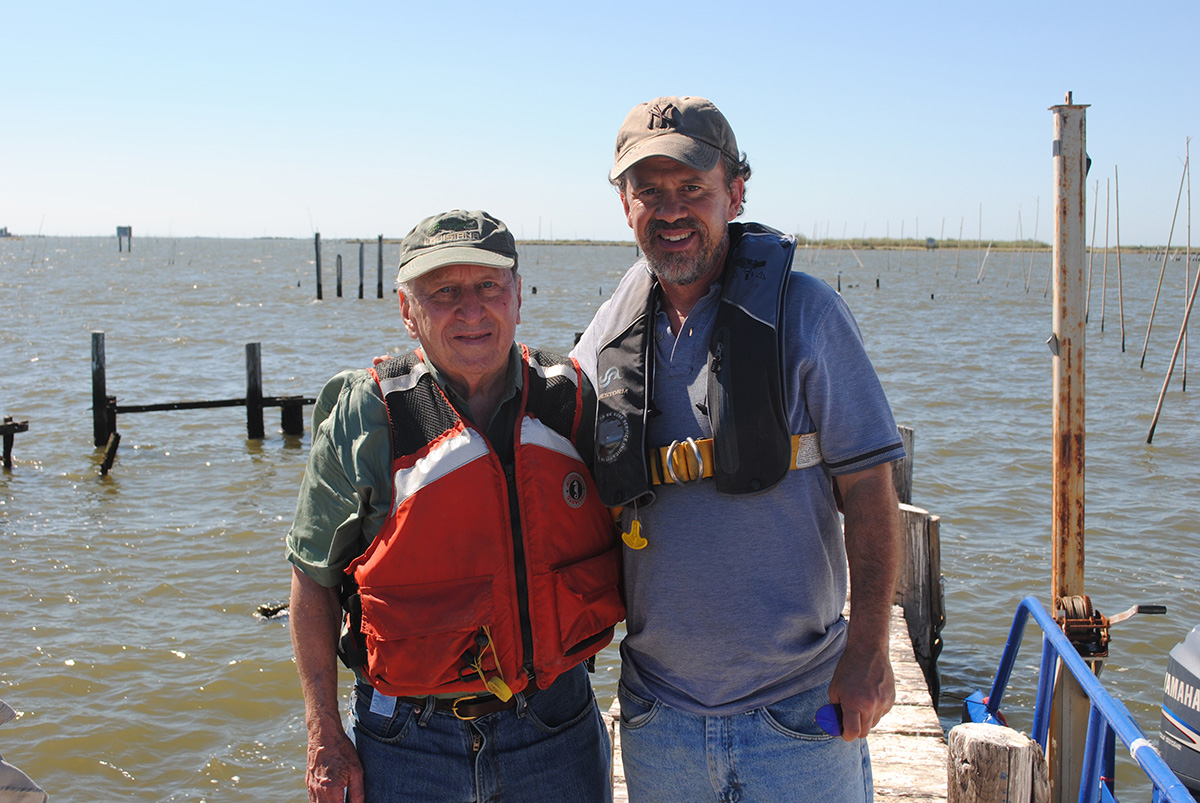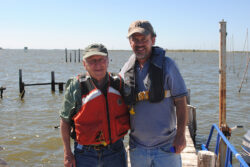Sherwood “Woody” Gagliano
Woody Gagliano sounded the alarm on Louisiana’s coastal land loss crisis and worked with his colleagues for decades to remedy the problem.

Coastal Environments, Inc.
Dr. Sherwood Gagliano and son Mark Gagliano, Bastian Bay, LA.
No discussion of Louisiana’s coastal crisis is complete without mentioning Sherwood “Woody” Gagliano. He and his colleagues were at the forefront of mapping the processes that were causing coastal land loss, and they also were among the innovators discovering tools to offset this threat to the state. In addition, Gagliano provided a consistent scientific voice about the ecological and public safety threats of the Mississippi River Gulf Outlet, and he boldly pointed out the impacts of the oil and gas industry on the coastal wetlands. While Percy Viosca, a state biologist in the 1920s, sounded warnings about coastal threats much earlier, Gagliano was able to motivate a much more robust response during his career and worked for decades to remedy these problems.
Woody Gagliano was born in New Orleans in 1935. Gagliano sought his education at Louisiana State University (LSU) with an interest in archaeology and coastal geology in the 1950s. He earned his bachelor’s degree in geology in 1959 and added a master’s in geography in 1963. Along the way his insatiable appetite for coastal field work led him to join research projects in South Carolina, Louisiana, Australia, Malaysia, and Peru. For his dissertation, he returned to his fascination with the intersection of archaeology and geomorphology and carried out a “geoarchaeological” investigation of prehistoric human settlement on Avery Island. He earned his PhD from the LSU Department of Geography and Anthropology in 1967. The interdisciplinary nature of his work carried over into his professional career and provided the backbone of the services offered by the company he later founded, Coastal Environments, Inc.
He participated in a late-1960s study for the US Army Corps of Engineers that sought to identify potential environmental impacts if Mississippi River water was diverted to the high plains of Texas. This investigation brought his attention to coastal land loss. The study showed quite convincingly that the Mississippi River delta was not building land as fast as coastal wetlands were disappearing. Gagliano transformed this insight into a research agenda that mapped the pace of land loss and developed coastal restoration tools. Using historical navigation charts, topographic maps, and aerial photographs, he and his colleagues produced a series of maps during the 1970s and 1980s depicting where land loss was most pronounced and its pace. These maps became key resources as other scientists and public policy makers turned their attention to the land loss crisis.
Gagliano thought beyond the crisis of land loss and was a key player in developing strategies to mitigate against it. He proposed artificial diversions to mimic the pre-levee flooding processes that delivered freshwater and sediment to coastal marshlands. Along with others, he promoted rebuilding barrier islands, restoring oyster reefs, and managing the hydrology of the wetlands to offset land loss. These ideas still provide the blueprint for the state’s current coastal protection and restoration plan.
Gagliano’s private consulting company, Coastal Environments, Inc., based in Baton Rouge, has been engaged in coastal projects since 1972. It has provided expertise in countless coastal projects and prehistoric cultural resources studies for state and federal agencies and private clients. In addition to providing innovative applied research, the company has nurtured multiple generations of coastal scientists that contribute to the state’s growing body of coastal experts.
In his lifetime Gagliano received numerous professional honors, among which are the Coastal Stewardship Award for Distinguished Achievement, the Lifetime Achievement Award from the Coalition to Restore Coastal Louisiana, and the Distinguished Alumni Award from the LSU Department of Geography and Anthropology. In addition he has received honors from both the archaeological and the engineering communities—a testament to his longstanding interdisciplinary approach. Gagliano died on July 17, 2020, at the age of 84.
